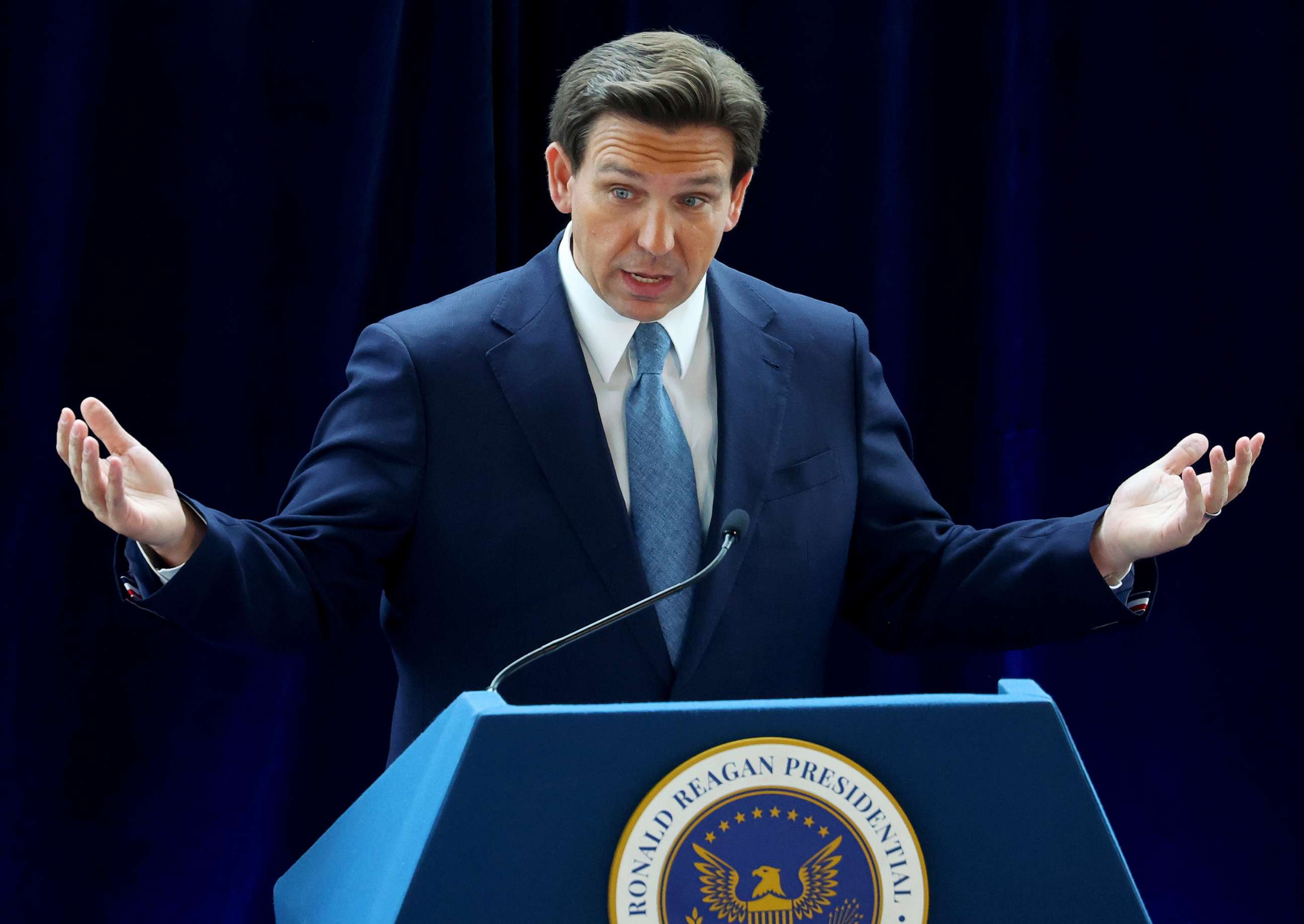Florida Legislature's agenda this session may offer clue to a DeSantis 2024 bid
This week is a busy one for Florida Gov. Ron DeSantis, with the state Legislature convening for their 2023 session and DeSantis traveling to the early presidential nominating state of Iowa -- though he's played down chatter about a White House bid.
During the two-month-long legislative session, Florida politicians are expected to tackle some of the country's most contentious issues in the wake of DeSantis' nearly 20-point reelection victory in November, alongside numerous other GOP wins in the state, which has energized conservatives there.
Republicans control both the state's House and Senate. If DeSantis notches more legislative wins this session, they could help him launch a stronger presidential bid.
Matt Terrill, the managing partner for Firehouse Strategies, a public affairs firm based in Washington, D.C., told ABC News in an interview that DeSantis has political capital that he's looking to spend following his landslide win.
"There's an environment there where he is going to have the ability to really enhance and champion and drive forward the Republican legislative agenda," Terrill said.

Education was and will continue to be a consequential issue. Republicans have introduced a bill that would prevent state universities from any programs or hiring practices involving diversity, equity and inclusion, allow review of a professor's tenure and remove any majors or minors in gender studies or other related topics -- which together amount to sweeping changes in higher education as part of DeSantis' response to what he calls "woke" excess that has infiltrated classrooms.
His opponents, in turn, have said he is anti-free speech and even authoritarian, wielding his power to target groups and ideas he doesn't like.
Republicans hope to expand on some of the restrictions in the Parental Rights in Education law -- labeled by critics as "Don't Say Gay" -- which passed last year and which banned discussion of sexual orientation and gender identity in certain K-12 classrooms, mostly those in third grade and younger, where DeSantis and others say it is inappropriate.
The new HB1223 would require educators to use the pronouns of a student's gender at birth, while a separate bill would require that students in sixth through 12th grades be taught "that sex is determined by biology and reproductive function at birth."
Another proposal Republican lawmakers are pushing is legislation allowing Floridians to carry a firearm without a state license. Currently, the state requires a background check and training courses for anyone seeking a permit.
That bill has drawn criticism from gun safety advocates such as Alyssa Ackbar, from March for Our Lives. Ackbar testified against the bill earlier this year.

GOP legislators also want to move forward on a defamation bill that would make it easier for public officials to sue news organizations and others who publish false information.
The measure would weaken the high bar for defamation claims as set in the U.S. Supreme Court's New York Times Co. v. Sullivan ruling, which for decades has required public figures show "actual malice" -- foreknowledge by a publisher that something was false or extreme negligence in handling the information -- in order to win a case. The defamation bill would also narrow the scope of who is considered a "public figure."
Increasing the ability to pursue defamation claims has become a huge part of DeSantis' platform. In February, he held a roundtable discussion on the topic. He also regularly criticizes how various parts of the news industry operate.
Regarding the media, Florida state Sen. Jason Brodeur has introduced a bill titled "Information Dissemination" which, if passed, would require bloggers who write about DeSantis and the Florida government to register with the state and disclose who is paying them for their posts.
The Legislature could take up yet other headline-making bills.
DeSantis has said over the past few months that he's willing to sign into law a so-called heartbeat bill that would ban abortions after six weeks. But as of now, no legislation has been filed. Currently, Florida prohibits almost all abortions after 15 weeks.
A six-week abortion ban was filed Tuesday in the Legislature's opening session.
SB 300 would prohibit "physicians from knowingly performing or inducing a termination of pregnancy after the gestational age of the fetus is determined to be more than 6 weeks, rather than 15 weeks, with exceptions; providing an exception if the woman obtaining the abortion is doing so because she is a victim of rape or incest, subject to certain conditions...."

Another potential bill spectators are watching out for is if Republican lawmakers put forth proposals that would repeal Florida's "resign-to-run" law, which states that an elected official must step down from office if they run for office in another state. This law would need to be changed for DeSantis to stay on as governor of Florida if he decides to run for president.
As state lawmakers convene again -- with DeSantis set for his State of the State speech on Tuesday -- the governor will also be making appearances elsewhere this week, traveling to Iowa on Friday.
Since releasing his memoir, "The Courage to Be Free," last month, DeSantis has ramped up his travels across the country. He finished a few stints at donor dinners in Texas and California last weekend and gave a high-profile speech at the Ronald Reagan Presidential Library and Museum in California, where he swiped at Gov. Gavin Newsom -- who has also criticized him -- and discussed Florida's gains over the past few years and the actions he's taken as governor.
DeSantis has publicly shrugged off the repeated questions about a 2024 campaign, but observers say his style bolsters that possibility.
"In the Republican primary, I think many voters are looking not just at a candidate's rhetoric but their record and who are the candidates who have gotten things done," Terrill said. "Those are elements voters will look at."




